Ballad of the Gasfitter 9
By Gerrit Achterberg
Translated by J.M. Coetzee
The higher I ascend, the wider space
yawns between You and me. Life seems to be
enclosed in steel and nickel. Every
last rivet of this structure is in place.
There is no gas here. God is the hole, and pours
out his depths upon me to reveal
to a presumptuous fitter how much more
exalted he becomes with every floor.
Beneath me storey after storey falls.
I don't know where I should begin, or what.
Perhaps a final word will spring to mind
if I ask him what was the first cause.
A shock runs through my frame. I must get out.
I give it over. Be it as he finds.
--------
Sequel to yesterday's post, the ninth sonnet in Achterberg's "The Gasfitter" sequence, from Robert Pinsky's Poet's Choice column in Sunday's The Washington Post Book World. "In art, as in life, we desire something between the familiar and the unfamiliar. If the person or party, poem or movie is completely predictable, it is repellent, boring," observes Pinsky. "At the other extreme, if there's absolutely nothing recognizable, that too is repellent, boring in another way. We want that tension or uncertainty or balance between the familiar and the unfamiliar." In this sonnet cycle, "the secret life of the gasfitter suggests the poem's maker, laboriously fitting words and sentences into a pattern befitting turbulent feelings and metaphysical dilemmas...these poems suggest the power of the half-known."
I spent most of Sunday being spiritual, first at younger son's Hebrew school where they were having a Life Cycles exploration including a mock Bar Mitzvah and a mock wedding, then celebrating Ostara at
So I was really happy to be among friends for a relatively small spiritual gathering.
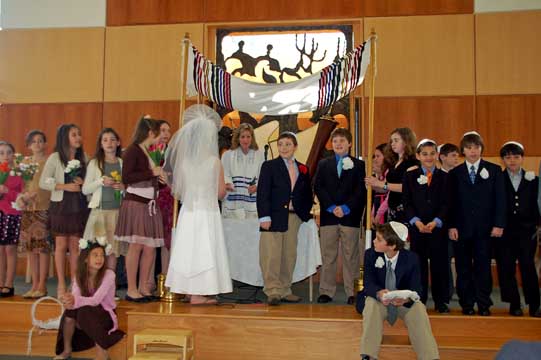
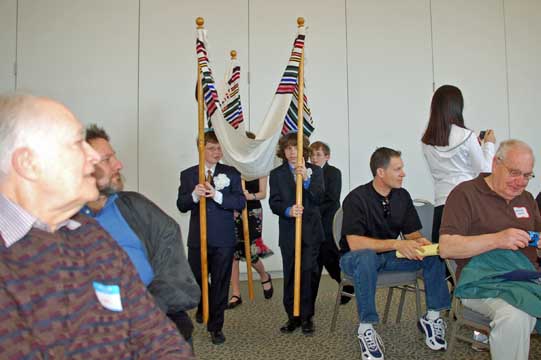
After walking his "daughter" down the aisle following the chuppah, he instructed her -- in a loud, stern voice -- to be a good wife. Everyone cracked up.

The rabbi had to help the "groom" get the ring on the finger of the "bride."
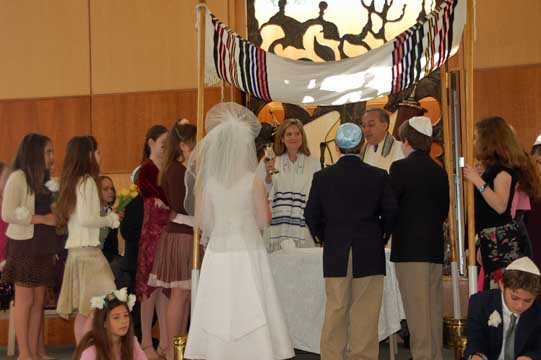
However, the blessing, sung by the cantor, went well.
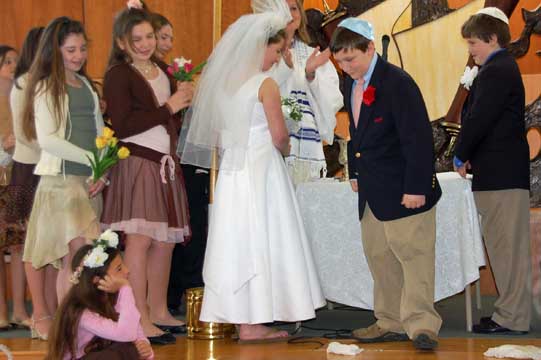
As did the breaking of the glass.
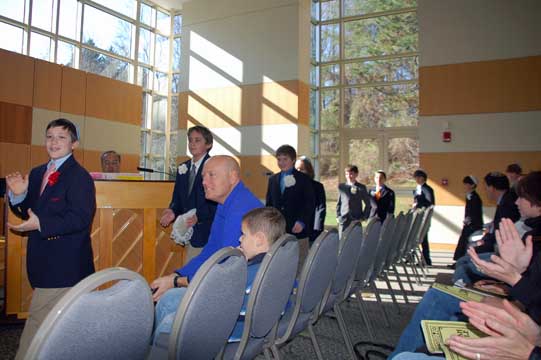
And then everyone danced around the room.
I spent the evening watching Rome, and then, proving that I have no willpower (and also that I wanted to see an "I alone pushed the captain!" moment from Jamie Bamber, and was not disappointed in that single regard, having been spoiled for pretty much everything else which was the reason I thought I could tolerate watching. Rome was impossible to spoil in some regards (if I say "asp" am I going to have a Trojan Horse "You ruined Troy!" moment?), but even the expected scenes managed to be moving, and I liked the ending though I can't say I loved it.
This whole season has been so painfully rushed and compressed that it's hard for me to feel much for any of the characters. Even the ones we knew well last season change without our seeing the changes: we don't actually see Antony and Cleopatra fall in love, for instance, just all of a sudden she's not only his lover but has him wearing kohl and calling Egypt home, until he decides he wants to die as a Roman. I don't mind not getting resolution to many of the minor stories -- Vorena's, Timon's, Agrippa's, even Octavia's -- there was no time to cover everything, but even in compacting it down to Rome a la Vorenus and Pullo, they have so many emotional shifts that we never see. One week Pullo adores his wife, then she's dead and he's with her killer, then he finds out his current lover killed his wife and murders her, then he's back to his old self looking for the son he never worried about or even appeared to think about till he realized Octavian meant to kill him, then bringing Vorenus back to Rome to watch him die...it's so much whiplash while Pullo pops back to being his usual smiling self.
I like the metaphoric humor at the start, Antony lost at sea, even though he knows exactly where he is. (He looks a hell of a lot better without the eyeliner.) And Pullo saying to tell Vorenus that Vorenus' children are well and Pullo hopes his own child as well, calling it a private joke...in fact that's a private joke for the audience, since we are the only ones privy to the scene who know who Caesarion's real father is. There's an orgy going on at Cleopatra's palace, apparently the Egyptian way to eat, drink and be merry, and the great love between Antony and Cleopatra ends with her betraying him to save herself and their children...frustrating because surely she knows that if she asked him to fall on his sword for herself and their children, he would have done so without her needing to resort to the deception of suicide. The dragged-out scenes where Antony practices for a battle with Octavian that never happens are also frustrating, because although any excuse to see James Purefoy shirtless works for me under most circumstances, it's a waste of time here where we could see actual character development, particularly of the women who are all mostly swept under the rug.
Instead we get male bonding: first Vorenus talking to Antony about the afterlife and then helping him kill himself in the most painfully intimate scene of the whole episode, then Pullo and Vorenus rekindling the friendship they once had and protecting one another's children, while through it all Octavian surrounds himself with his coterie of yes-men who keep their personal agendas quiet when he's around. Cleopatra finally has a strong moment facing him in public, and she's quietly admirable in her choice of death, but she's been a decadent fluff character for so long that it's not only too little, too late but almost intrusive on the storylines I really want to see resolved.
And we're led to believe her arrogance is why Caesarion has such a big mouth and triggers the fight that gets Vorenus mortally wounded...just another version of Atia and Servilia, the mothers whose principal power is to warp their sons. There's ultimately some nice bonding moments between Pullo and Vorenus and Pullo and Caesarion/Aeneas, who learns to appreciate his real father's cleverness before he knows he's his father. Livia keeps bragging about her clever husband, and Octavian seems very sure that he's quite a clever boy, better than Mummy ever expected, but he misses so many major things right under his nose from Cleopatra's plan to kill herself to Pullo's sneaking Caesarion away that one wonders how he was the dictator of Rome for over 40 years.
BSG...so contrived, predictable and hyper-written that if it did not have a cast of exceptional actors, I would be boggled that it's still on the air. The post-Caprican judicial structure is supposed to resemble ours -- that's necessary to make us relate to their system of justice, so we accept the verdict and how it's decided, until they decide to revisit it (when Roslin fires all the judges and appoints her cronies, heh...no wait, that would be too direct a critical comment on US conservatives). Yet we have whacked-out stuff like a demand that a son testify against his own father, by a lawyer on his own side. Of COURSE she was coming back and of course they do not plan to tell us who is actually or is actually not a Cylon till next season, though I am far beyond caring.
And I won't even start on the Miracle Interspatial Time-Traveling Bob Dylan. I know I saw a movie long ago where androids could be identified by how they responded to a certain strain of music, I think it was Beethoven. I cannot, for the life of me, remember what the movie was. But it wouldn't have bothered me to see a similar storyline in typical MooreRon ripoff if it wasn't for the Miracle Interspatial Time-Traveling Bob Dylan! Who is surely going to turn out to be a Cylon himself! Sheesh.

No comments:
Post a Comment